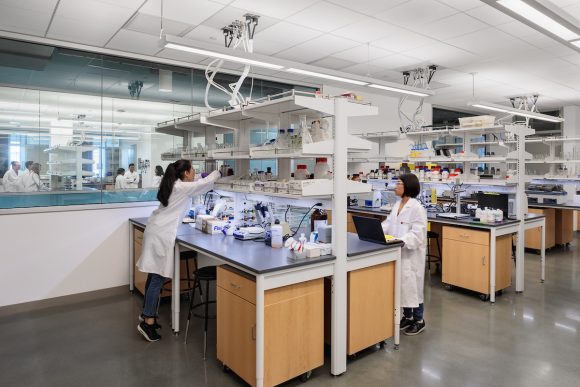August Research Highlights New research in neurodegeneration, isolation, and superoscillations
September 11, 2024
Chapman University’s science facilities have been in the news recently, ranking number five nationally on a list of best science lab facilities provided by the Princeton Review’s Best 390 Colleges guidebook. You can take a virtual tour of the Keck Center for Science and Engineering by watching this video.

Chapman’s science lab facilities were recently ranked in the top five nationally by the Princeton Review.
Rebecca Glineburg, assistant professor of biological sciences, has published a new paper titled “Stress granule formation helps to mitigate neurodegeneration” in the journal Nucleic Acids Research. Multiple neurodegenerative diseases are thought to be caused by an overactive stress response in neurons. Glineburg’s study shows that inhibiting a key step in this stress response pathway can increase neurodegeneration, suggesting a role for stress response pathways in mitigating the onset of disease. It includes student co-author Jaclyn Pak ’23.
Sun (Coco) Yang (School of Pharmacy) and Cyril Rakovski (Computational and Data Sciences, Schmid College of Science and Technology) have been awarded a Merck Investigator-Initiated Study Grant of $130,000 for their project titled “Evaluating the Impact of Human Metapneumovirus (hMPV) Infection on Infants and Children During the COVID and RSV Control Era.” This interdisciplinary team will investigate changes in hMPV infection rates among infants and young children, further characterizing the infection’s impact across different age groups.
Patricia Lopes, associate professor of biological sciences and the Wang-Fradkin Junior Professor, has published a new paper entitled “The effect of acute social isolation on neural molecular responses in components of the social decision-making network.” The study, which is published in the journal BMC Genomics, explores how short periods of isolation can change the brain. Six current and former Chapman University undergraduates are co-authors, including Madeleine Chang, Biola Fatusin, Sachin Patel, Chandler Siemonsma, and Morgan Kindel.
Jeremy Hsu, assistant professor of biological sciences, has published a new paper entitled “Defining evolution: exploring students’ conceptions of evolution in introductory biology courses.” Hsu and colleagues studied how more than 300 students define and conceive of evolution, finding that students held a number of different conceptions that were often not normative. Definitions of evolution did not vary among 2- and 4-year college students or among different majors of study. The research is published in the journal Evolution: Education and Outreach and includes co-author Kate Hill, assistant instructional professor of biological sciences.
Daniel Alpay, Foster G. and Mary McGaw Professorship in Mathematical Sciences, has published a new paper entitled “Short-time Fourier transform and superoscillations.” Alpay worked with former Grand Challenges Initiative Postdoctoral Fellow Kamal Diki and with President Daniele Struppa to investigate new results on the theory of superoscillations using time-frequency analysis tools and techniques such as the short-time Fourier transform (STFT) and the Zak transform. The study builds on work by Yakir Aharonov, who is the Co-Director of the Institute for Quantum Studies, Professor of Theoretical Physics, and the James J. Farley Professor of Natural Philosophy at Chapman.

